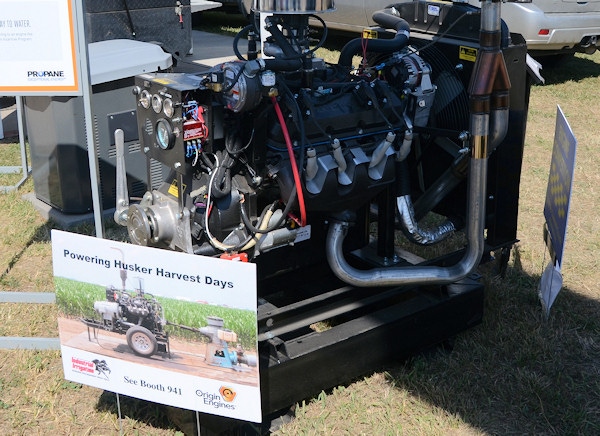April 19, 2016

The propane industry wants you to think about their fuel as an alternative, and they're putting up cash as an incentive. It's an interesting idea and Farm Industry News has had several conversations with Cinch Munson, who heads up the Propane Education & Research Council ag business development, about the fuel. He talks fondly of the benefits of making the switch.
For the 2015 incentive program, the organization collected data so they're not only putting their money where their mouth is they're showing research from actual users of the benefits of making the switch to propane. The data was collected as part of the Propane Farm Incentive Program which tested new propane equipment including irrigation engines, grain dryers, flame weed control systems, premium generator sets and ag heating systems.
Program participants were offered a financial incentive toward the purchase of new propane equipment in exchange for real-world performance data.
Saving in the face of falling oil prices
"We believe a farmer can save money when they switch to propane," Munson says. "However in 2015 I thought they would save money even with diesel prices down, but not as much. Somewhat to my surprise, we had some of the highest savings."
The savings was 58% for irrigation engines, according to the survey, came for irrigation engines. Munson says he believes that one reason may be that when those propane powered irrigation pumps were running it was the peak of the summer. "That's often when diesel is at its highest price," he observes. "Propane is a cost-effective alternative."
In the irrigation market, the competitors are diesel, propane and electricity. And many irrigators reading this are probably using all three forms of power to run pumps. The rising cost of electricity has many looking at alternative power. Munson adds that there's a new wrinkle - the Tier 4 engine. All diesel engines have to meet very stringent emission standards which has forced a move by all makers of a specific size engine to move to selective catalytic reduction.
While the new engines are efficient get the job done, they're also 15 to 25% higher than their predecessors in the diesel power field. Propane engines, which are based on spark engine designs meet tight emission standards without added after-treatment like SCR or a particulate filter.
Electric motors can be very efficient and depending on where you are, they're competitive to propane, Munson notes. The challenge is infrastructure - the wire - to that motor versus a propane tank.
Grain dryer savings too
In 2015 those farmers that took advantage of the incentive to invest in a new grain dryer saw savings too. In fact, they saw a 43% improvement in efficiency. "In the grain dryer market we're not usually competing against another fuel, we're looking at a newer, more efficient dryer," Munson says. "In these situations its more propane versus propane, but what we saw this year is that by converting from the older inefficient grain dryer to a more efficient dryer, they could reduce energy consumption per bushel by 43%."
He notes that's a significant savings just moving to newer dryer technology. Munson adds that PERC also looked at other savings found from a more efficient dryer - such as no need to take grain to town to dry. That kind of change boosted savings from 1% to 10% for study participants, so the savings actually ranged as high as 50% for some users.
Incentive plan for 2016
Munson reports that PERC will have another incentive program this year with a focus on irrigation engines, prime power generation equipment and propane-fueled poultry, swine and greenhouse systems.
"The irrigation engine market is still important, and it's important to let people know the incentive is available as the ag industry faces more Tier 4 equipment," Munson says. "The incentive for irrigation engines for this year will be $300 per liter of engine size."
He notes that propane engines are less expensive than diesel engines, but the incentive "really tips the scale in propane's favor," Munson adds.
The second category - prime power - is a growing area for propane engine use. "We're not talking about a backup generator," Munson clarifies. "This is for systems that are the sole power for an operation."
He notes that in California where electricity costs have skyrocketed in recent years, some farms are looking to propane as their power source. The incentive here is $30 per kilowatt of power produced up to $5,000 for the investment. "That works out to about $300 per liter of engine displacement, similar to the incentive offered for irrigation engines," Munson says.
And finally, the installation of a propane-based heating system could earn an incentive. Munson explains that these are complete systems which may be part of new construction, or to be eligible in an existing structure the farm has to be converting from another fuel source. The incentive here is 10-cents per square foot of building up to $2,000. Which would be for a 20,000 square foot facility.
If you're interested in an incentive to purchase an engine or convert to propane in one of these areas, you can learn more at propane.com/farmincentive.
About the Author(s)
You May Also Like






